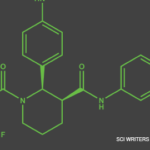On Oct. 8, ChemoCentryx Inc. announced that the U.S. Food & Drug Administration (FDA) has approved avacopan (TAVNEOS), an orally administered selective complement 5a receptor inhibitor, as an adjunctive treatment of adult patients with severe active anti-neutrophil cytoplasmic autoantibody-associated vasculitis (ANCA-associated vasculitis), specifically granulomatosis with polyangiitis (GPA) and microscopic polyangiitis (MPA) (the two main forms…

Vasculitis Guidelines in Focus, Part 4: Polyarteritis Nodosa
Jason Springer, MD, MS, served as one of the lead authors of the ACR/VF guidelines for polyarteritis nodosa (PAN), and talks about the recommendations specific to PAN here.

Vasculitis Guidelines in Focus, Part 3: EGPA
In this third article in the series, we talk with Philip Seo, MD, MHS, about eosinophilic granulomatosis with polyangiitis (EGPA).

Vasculitis Guidelines in Focus, Part 2: ANCA-Associated Vasculitis
Sharon Chung, MD, MAS, discusses specific recommendations for the treatment and management of ANCA-associated vasculitis from the latest ACR Guideline.

Vasculitis Guidelines in Focus, Part 1: The Guideline Project
Sharon A. Chung, MD, MAS, director of the vasculitis clinic at the University of California, San Francisco, served as the principal investigator of the overall vasculitis guideline effort and talks about the process here.

FDA’s Arthritis Advisory Committee Narrowly Endorses Avacopan Approval
On May 6, the U.S. Food & Drug Administration’s (FDA’s) Arthritis Advisory Committee narrowly voted in support of avacopan, a C5a receptor inhibitor, for the treatment of adult patients with anti-neutrophil cytoplasmic antibody (ANCA) associated vasculitis. Although the panelists were excited about the possibility of a steroid-sparing therapy, some raised questions about whether results from…

Efficacy of Tocilizumab Monotherapy After Ultra-Short Glucocorticoid Administration in GCA
In a small study, patients with GCA maintained remission after receiving three days of treatment with methylprednisolone followed by tocilizumab.
Tocilizumab After Ultra-Short Course Steroids Promising for Newly Diagnosed GCA
NEW YORK (Reuters Health)—Tocilizumab induced a slow and lasting remission after an ultra-short pulse (three days) of steroids in newly diagnosed giant cell arteritis (GCA) patients, a proof-of-concept trial shows.1 His early research on cytokines and glucocorticoids led Peter Villiger, MD, of Medical Center Monbijou, Bern, Switzerland, to find ways to reduce steroid use, he…
The ACR/Vasculitis Foundation Release Three New Guidelines for Treatment of Vasculitis
ATLANTA—The American College of Rheumatology (ACR), in partnership with the Vasculitis Foundation (VF), released three new guidelines for the treatment and management of systemic vasculitis. Vasculitis is a group of about 20 rare diseases that have inflammation of blood vessels in common, which can restrict blood flow and damage vital organs. The three guidelines cover…

Untangling the Diagnosis & Management of GCA
Vision loss, implications of treatment and more—Sarah Mackie, BMBCh, PhD, MRCP, discussed the latest research on the evaluation and management of giant cell arteritis.
- « Previous Page
- 1
- …
- 5
- 6
- 7
- 8
- 9
- …
- 21
- Next Page »